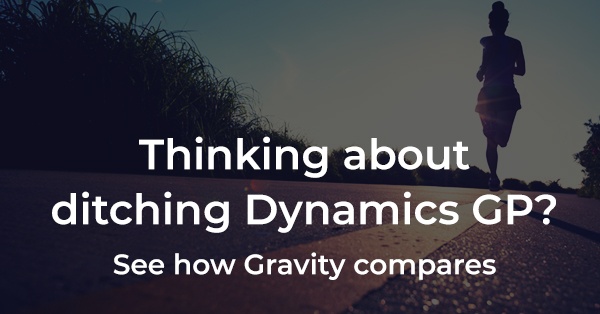Pros and Cons of legacy accounting solutions | Best Alternatives

If you’ve worked in finance long enough, you’ve likely encountered a wide range of accounting software providers — especially long-standing Microsoft accounting products that have used multiple names over the decades. With frequent acquisitions, rebrands, and shifting product lines, it’s increasingly difficult to keep track of how these systems evolved and where they stand today.
Understanding the strengths and limitations of these legacy accounting systems can help you determine whether they’re still the right fit — or if your organization has outgrown them.
Microsoft Dynamics overview
Software Connect describes Microsoft Dynamics as "a line of integrated, adaptable business management solutions", while PC Mag notes the lineup "was built by acquisition" over several decades.
Microsoft Dynamics timeline:
1981 — Great Plains Software is founded in Fargo, North Dakota.
2000 — Great Plains acquires competitor Solomon Software, fueling significant consolidation in the accounting software market.
2000 — Danish companies Navision and Damgaard merge.
2001 — Microsoft acquires Great Plains — and with it, Solomon Software — bringing mid-market solutions under the world’s largest software company.
2002 — Microsoft acquires Navision for $1.45B, integrating it into Microsoft Business Solutions and expanding into European markets.
2005 — Microsoft launches the Dynamics brand, converting its products into:
- Microsoft Dynamics GP
- Microsoft Dynamics NAV
- Microsoft Dynamics SL
- Microsoft Dynamics AX
Most Dynamics products are sold and supported through value-added resellers (VARs) who manage installation, customization, and support. While this creates a level of personalized service, it also means buyers must evaluate both the software and the quality of the VAR.
Pros of Microsoft Dynamics:
- Comprehensive features across financials, inventory, and HR
- Large library of customizable reports
- Trusted, long-standing product family
Cons of Microsoft Dynamics:
- Complex and not user-friendly for non-technical users
- Costly Azure hosting and upgrade requirements
- Not a true cloud accounting system
- Some Dynamics products are on limited-support or sunset paths.
Microsoft Dynamics GP overview
Microsoft Dynamics GP remains one of the most widely used legacy ERP systems for small and mid-market businesses. It offers deep functionality across financial management, inventory, HR, and analytics.
However, despite its popularity, Dynamics GP is no longer evolving as a modern cloud solution. The latest versions operate as hosted systems in Azure, not true web-native cloud software.
Pros of Microsoft Dynamics GP:
- Strong financial and operational features
- Extensive reporting and customization
- Large user community and long market history
Cons of Microsoft Dynamics GP:
- Steep learning curve and complex setup
- Extra hosting and upgrade costs on Azure
- Not cloud-native, limiting flexibility and mobility
- Major development has ended; only limited support remains.
Dynamics SL overview
Formerly known as Solomon, Dynamics SL is optimized for project-driven organizations such as government contractors, engineering firms, and construction companies. Although it integrates well with Microsoft tools, many users report outdated functionality and operational frustrations.
Pros of Dynamics SL:
- Good fit for industries requiring project-based accounting
- Strong Microsoft application integrations
Cons of Dynamics SL:
- Outdated interface and functionality
- Performance issues with large datasets
- Frequent need for workarounds for everyday processes
- No major new releases; product is effectively discontinued.
Dynamics NAV- Business Central overview
Originally launched as Navision, Dynamics NAV eventually transformed into Dynamics 365 Business Central. Microsoft describes Business Central as offering “the same rich functionality as Dynamics NAV,” built for small to medium-sized businesses.
Its global capabilities — including multi-language and multi-currency support — make it appealing for international companies. However, it still has key gaps that affect multi-entity organizations.
Pros of Dynamics NAV (Business Central):
- Good fit for industries requiring project-based accounting
- Strong Microsoft application integrations
Cons of Dynamics NAV (Business Central):
- Lacks built-in multi-entity accounting.
- Requires third-party apps for consolidated reporting.
- Built on an older proprietary platform.
- NAV is discontinued; migration to Business Central is required.
Sage 50cloud Accounting overview
Previously known as Peachtree, Sage 50cloud blends traditional desktop accounting software with limited cloud connectivity. While praised for strong payroll and tax capabilities, the system still relies heavily on local installations and can be resource-intensive.
Users often describe it as complex, unintuitive, and expensive to integrate.
Pros of Sage 50cloud Accounting:
- Reliable payroll and tax calculations
- Trusted by small businesses
Cons of Sage 50cloud Accounting:
- Not fully cloud-based; requires installations.
- Difficult user interface and reporting setup.
- Costly integrations for small businesses.
- Slow product innovation compared to cloud alternatives.
Why Gravity Software is the best alternative to legacy accounting systems
Legacy accounting software was designed for an era when businesses operated with simpler structures, fewer entities, and minimal digital integration. Many of these systems now require frequent upgrades, separate databases, costly hosting, or third-party add-ons just to deliver basic functionality.
Gravity Software is different.
Built natively on the Microsoft Power Platform, Gravity combines modern cloud architecture with multi-entity capabilities that legacy systems simply cannot match.
Key benefits of Gravity Software
1. True Multi-Entity Accounting
Manage all entities in a single database. Automate intercompany entries, consolidate reporting, and eliminate redundant data entry.
2. Cloud-Native Platform
No servers. No hosting fees. No manual upgrades. Gravity updates continuously so your team always uses the latest version.
3. Seamless Microsoft Integration
Gravity connects directly with Teams, Excel, Power BI, Outlook, SharePoint, and OneNote — without requiring Office 365 licenses.
4. Scalable for Growth
Whether you manage 5 entities or 2,000+, Gravity handles the complexity without the need for expensive add-ons or multiple databases.
5. Easy to Customize
Use clicks—not code—to create workflows, add fields, and tailor the system to your organization.
The advantages of Gravity over legacy systems
Simplify your operations:
Legacy systems often rely on separate modules, databases, or third-party add-ons. Gravity replaces fragmented systems with one unified platform.
Stay ahead with continuous updates:
Legacy tools require annual updates, migration projects, or costly hosting upgrades. Gravity provides continuous improvements without extra fees.
Built for growth:
As your business grows — new locations, new entities, new reporting requirements — Gravity grows with you.
Move beyond legacy accounting solutions
Microsoft Dynamics, Sage 50cloud, and similar legacy systems served businesses well in the past. But modern organizations need cloud-based, scalable, and integrated accounting solutions.
Gravity Software delivers everything legacy products lack — without the cost and complexity.
Ready to leave outdated systems behind?
Schedule a demo of Gravity Software today and experience smarter, better accounting for your growing business.
Gravity Software
Better. Smarter. Accounting.
Updated on November 2025 to reflect the latest changes to legacy Microsoft Dynamics products.



